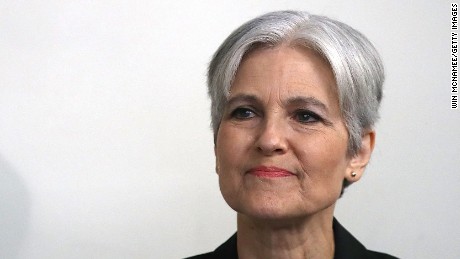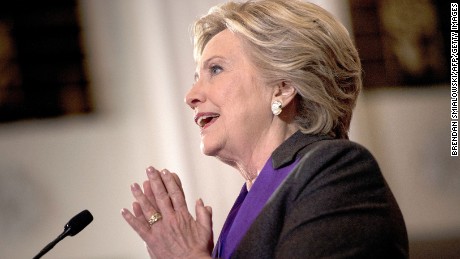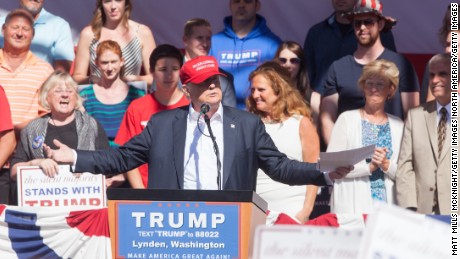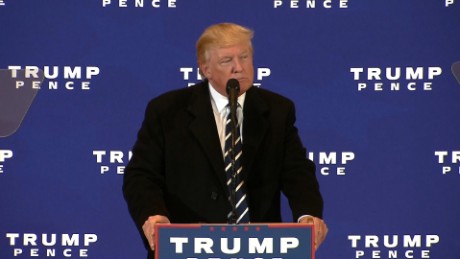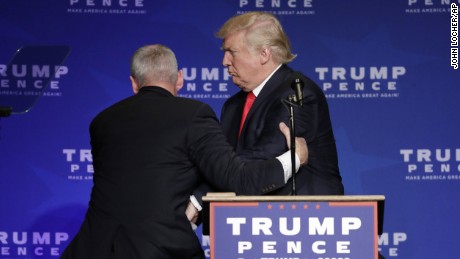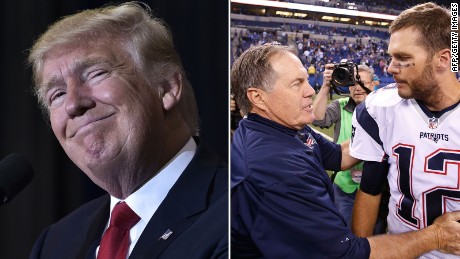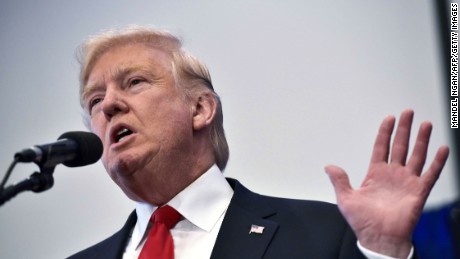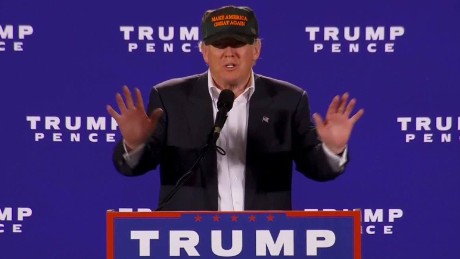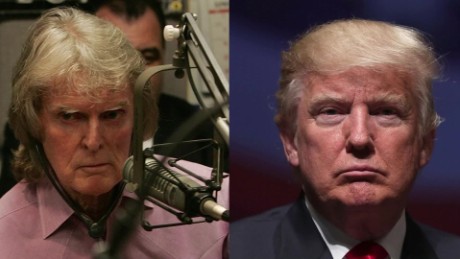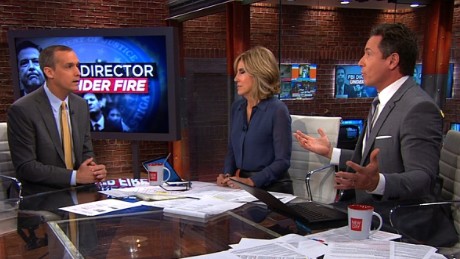Story highlights
- CNN interviewed more than a dozen veteran GOP campaign strategists and others about what Trump needs to do to win
- Most said Trump faces an uphill battle
- Yet all agreed not to underestimate Trump
(CNN)Donald Trump's transition from primary flame-thrower to general-election standard bearer has been marked by controversy.
In just the past week, he's caused an uproar by blasting the Republican governor of New Mexico -- one of the party's most prominent Latinas -- while also calling Elizabeth Warren "Pocahontas" and abruptly parting ways with his recently hired political director.
But there are also signs that he's willing to moderate some of his primary positions and take more conventional steps to prepare for November, such as building out a national finance team, hiring a pollster, accepting checks from wealthy donors and hitting the fundraising circuit.
CNN interviewed more than a dozen veteran Republican campaign strategists, pollsters and past and current officeholders about what Trump needs to do to win.
Their consensus: He needs to flip blue-leaning states to his column, soften his public image -- particularly as he targets independents, women and minority voters -- and drive up Hillary Clinton's already high negatives even further.
Most said Trump faces an uphill battle in a race that promises to be one of the most divisive and vitriolic in recent memory, one in which both Trump and Clinton have historically high unfavorable ratings.
Yet all agreed on one thing after a primary season that shattered conventional wisdom: Don't underestimate Trump. A recent Quinnipiac poll found Trump and Clinton in an extremely tight race in several vital swing states.
"Everything that so many of us have learned by observing politics for the last 30, 40 years is going to be challenged this cycle," said Ari Fleischer, former press secretary to George W. Bush. "Don't be surprised if Donald Trump is sitting in the Oval Office on January 20th."
Here's a look at the Trump roadmap, based on these interviews:
A whole new map
Trump must win every state Mitt Romney did in 2012 -- plus an additional 64 electoral votes. In the past few elections, Republicans have looked to a handful of battleground states to put them over the top: among them, Virginia, Florida, Ohio and Colorado.
The Quinnipiac poll had Trump and Clinton neck-and-neck in Pennsylvania and Ohio.
Still, GOP veterans believe the traditional swing states make up a tough line-up for Trump. The Republican primaries consistently revealed Trump's weakness with minority and educated voters -- vulnerabilities that do not bode well for Trump in an increasingly blue state like Virginia.
"If you add up African-Americans, Asians and Hispanics in Virginia, which are all growing constituencies, that's about one third of the electorate," said Tucker Martin, a Virginia consultant and former aide to ex-Gov. Bob McDonnell. "And then you combine the fact that we're a well-educated state -- it's a very bad match for him."
Meanwhile, western states like Colorado with sizable Latino populations could also prove to be problematic for Trump.
"He can't lose the states that Romney won. If he starts losing states that Romney won, it's over," said political consultant John Brabender, who was a senior strategist to Rick Santorum, the former Pennsylvania senator who has endorsed Trump. "The states that Romney thought were in play -- can Trump put them in play?"
All eyes on the Rust Belt
In other words, Trump must redraw the map.
That means targeting states with demographics that favor Trump, such as blue collar, less educated and older white voters, and even competing in states that have consistently leaned blue in recent presidential elections. A key part of Trump's strategy is to ensure high turnout of white, working class Republican voters. But he's also looking to capture a segment of the Democratic base with his populist economic message.
"I really think he has an opportunity with working class Democrats, who we knew years ago as Reagan Democrats," said Michigan Republican strategist John Truscott. "That's where his unique opportunity is to get some cross over."
All of this brings Trump to the Rust Belt.
Former Virginia Gov. Jim Gilmore, who ran for president this cycle and is now calling for the GOP to unite behind Trump, said he expects this region to be Trump's gateway to a November victory.
"If Donald Trump can hold the South, and I think he can, and all of a sudden become the spokesman for the disenfranchised working men and working women in the industrialized Midwest, suddenly he can be competitive in Ohio, Michigan, Wisconsin, Indiana, Minnesota and Pennsylvania," Gilmore said.
(Trump won three of those states -- Michigan, Indiana and Pennsylvania -- during the primaries).
Pennsylvania strategist Mark Harris believes the cards are stacked against Trump in the general election. The significance of Trump pulling off a victory in the Keystone State, which has not voted for a Republican presidential nominee since 1988, is difficult to overstate, he said.
"Pennsylvania, Ohio, Wisconsin -- those sorts of states I think are going to be important to his efforts. And certainly probably are friendlier than the Floridas and Colorados of the world," said Harris, who worked for Marco Rubio's super PAC.
Trump's populist, economic message has deeply resonated in former industrial states across the Midwest and Northeast -- once the center of the country's manufacturing boom.
As part of a broader foreign policy view that promises to put "America first," Trump regularly laments that the United States has become second-tier next to countries like China and Japan. Campaigning in areas where voter frustration and anger about the economy run deep, Trump has been relentless in his attacks on international trade agreements and companies that outsource jobs.
In the general election, Trump is expected to slam Clinton for saying earlier this year that as President, she would "put a lot of coal miners and coal companies out of business."
New Jersey state Sen. Mike Doherty, one of Trump's earliest political supporters, said the key to Trump's success in the Rust Belt will have everything to do with the candidate staying on message on the economy.
"I would continue to focus on the United States has been de-industrialized, these international trade agreements have been a disaster and we need to make better deals," Doherty said. "The real issue is the economy."
A race to the bottom
As he stands on the cusp of formally accepting his party's nomination in July, Trump's unfavorable ratings are through the roof. Trump is determined to make Clinton equally toxic -- perhaps the only condition under which he can defeat her.
Never have both the Democratic and Republican presumptive White House nominees suffered from such historically high negative ratings. A CNN/ORC poll this month showed 56% of voters view Trump unfavorably, while 49% have a negative view of Clinton.
"Both of them have such significant vulnerabilities that it's just a matter of whether there is a major stumble by either one of them or one campaign better exploits the weaknesses of the other," said Peter Ernaut, a Nevada GOP strategist. "These actual campaigns are going to matter a lot."
It's an ugly match-up that could bring out an unprecedented level of vitriol in the general election.
Republicans believe Clinton's high negatives, fueled by the widespread perception that she is not honest or trustworthy, should be one of Trump's biggest advantages -- even as he is widely disliked himself.
"I'd make this campaign a race to the bottom," said Gregg Keller, who has advised Wisconsin Gov. Scott Walker. "I believe the pathway to victory is not in convincing (some people) to vote, but convincing them not to vote at all."
In other words, Trump needs high turnout from his supporters while discouraging Clinton voters from showing up.
Trump is already waging full war against Clinton.
Labeling her "Crooked Hillary," Trump has hit the former secretary of state on her qualifications, pointing to her past support for the Iraq War and her handling of the downfall of Libyan dictator Moammar Gadhafi. One scandal that's poised to continue haunting Clinton is her use of a private email server at the State Department, particularly after an Inspector General report released last week said she failed to follow proper protocol.
Trump's attacks have not only targeted Clinton but also her husband.
He's revived controversies dating back to Bill Clinton's presidency, including the former president's affair with Monica Lewinsky and other allegations of sexual misconduct. Last week, Trump dredged up one of the ugliest debunked conspiracy theories from the 1990s, telling The Washington Post that he believed there was something "fishy" about Vince Foster's death. Foster, who was a personal friend of the Clintons and served as Bill Clinton's White House deputy legal counsel, committed suicide.
The episode foreshadowed the bitterly personal feud that is likely to fuel the general election.
"Hillary Clinton has never run against a candidate with ten arms and eight legs like Donald Trump. He's going to be all over her," said GOP consultant Alex Castellanos. "She couldn't figure out how to run against a skinny, first-term, U.S. senator named Hussein ... much less this political raptor, which is what Donald Trump is."
Trump's rhetoric
Republicans agree that Trump's success so far has largely centered on his aggressive tone and his famous aversion to political correctness.
"He needs to double down on being Donald Trump, don't try to play to the middle, don't try to moderate, don't try to be anything that you're not," said Keller, the Scott Walker adviser. "You have a brand that is recognizable to tons of people. Don't abandon that."
But Republicans also caution that the general election is an entirely different beast. Trump's political success has centered on his nontraditional rhetoric and approach to the nation's problems. But he still may need to find a way to moderate his tone for the broader general election audience.
One of Trump's biggest challenges heading into November is to broaden his appeal and convince non-primary voters to support him in November. That includes winning over independents and even some Democrats, and stopping the bleeding with minorities, younger voters as well as suburban and moderate Republicans -- particularly women.
"Make the tone a little bit more appealing to everybody -- make it a little bit more G-rated," said veteran pollster and strategist Jim McLaughlin. "Make it so that that Walmart mom, that middle class mom, heck, that African-American mother, that Latino mother that is looking for the best for their children will say, you know what, he's got better ideas than Hillary Clinton does."
Lanhee Chen, a top policy adviser to Romney, said Trump must effectively beat back Clinton's suggestion that he is "an unserious person for a serious time" if he wants to broaden his base heading into November. A critical part of that, Chen said, is to get much more serious about policy.
"It would seem to me that the best way to counteract would be by saying, 'Look, I've got some serious ideas. And it doesn't need to be a 200-page policy book but it does need to be more than, 'We're going to get tough on China,'" Chen said. "That would be effective for both for independents but also for conservatives who have questions about what is this guy going to do."
CORRECTION: This story has been updated to reflect that Donald Trump would need to win 64 more electoral votes than Mitt Romney to win the election.


